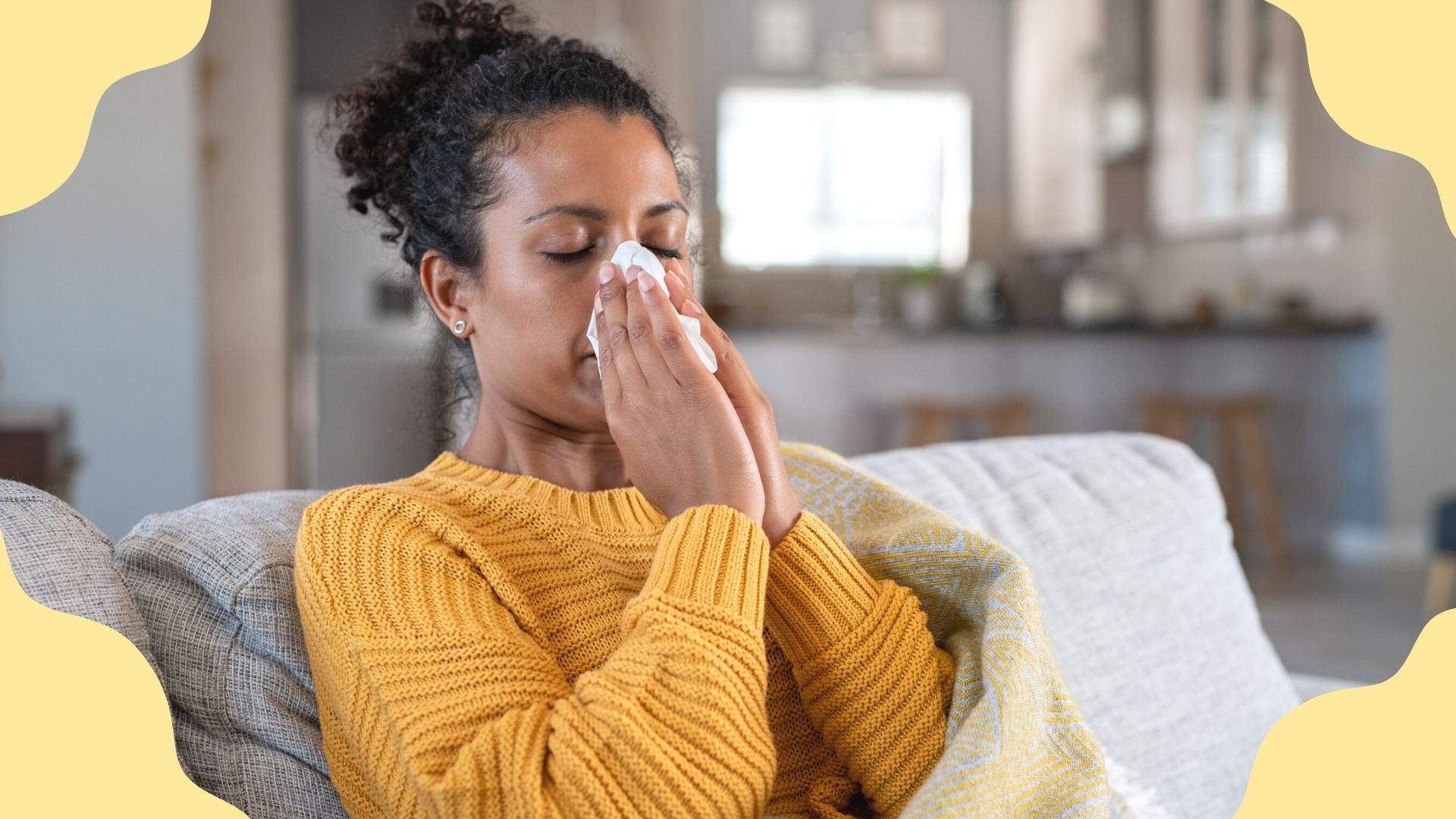Why is my hay fever so bad? Find out from the experts why you can't stop sneezing
With factors such as stress, diet, and climate change all affecting how you'll fair this allergy season, discover why you can't seem to shake the sniffles


Wondering why is my hay fever so bad? Hay fever impacts all of us differently, with symptoms ranging from a mild, snotty nose to red eyes and uncontrollable sneezing when pollen comes into contact with your nose, mouth, or eyes.
Of course, knowing when allergy season starts is a good way to predict when symptoms will flare up, but other factors such as warm spells of weather, a stressful day at work, or even what we've eaten that day can all lead to a more intense bout of hay fever. While preventive measures, such as vaseline, nasal sprays, and hay fever natural remedies are good to have in your allergy arsenal, understanding how your environment impacts your seasonal allergy is helpful if you want to try and reduce unpleasant symptoms like puffy eyes and a scratchy throat.
To find out how and which factors impact our seasonal allergies, we enlisted the help of allergy experts, to explore what causes hay fever to feel worse on some days, and whether or not there's a cure for it.
Why is my hay fever so bad?
If your friends or family members don't suffer from hay fever, it can feel a little isolating at times, but the UK has some of the highest prevalence rates of allergic conditions in the world, with over 20% of the population affected by one or more allergic disorders, according to Allergy UK.
"Generally speaking, grass and tree pollen are the causes of the majority of pollen-driven hay fever symptoms," says independent pharmacist, Rita Ghelani. "Allergy UK has revealed that climate change and the increasing temperatures in the UK may contribute to extending the grass pollen season and, as a result, more pollen is being produced."
Here, our experts delve into why hay fever season has become worse for allergy suffers.
1. Climate change
In a study conducted at the University of Worcester, a new pollen forecasting system suggests that the climate emergency could increase future allergy season severity by up to 60%, and even now, is starting to have an impact on hay fever sufferers.
Sign up to our free daily email for the latest royal and entertainment news, interesting opinion, expert advice on styling and beauty trends, and no-nonsense guides to the health and wellness questions you want answered.
“Because of climate change, we will see an increase in carbon dioxide (CO2), which is a major growth factor for plants, trees, and flora, and will change growth patterns," says Dr Ross Walton, an immunologist, clinical researcher, and founder at A-IRCR. "These changes will undoubtedly alter flowering seasons, prolonging pollen-producing periods. In addition, as we're experiencing a move away from the freezing winters to milder, wetter ones, we can expect that the native flora will have a prolonged flowering season.
"This new climate may also support the growth of non-indigenous species of plants, trees, and grasses, which will have their own flowering season, adding to our allergy burden and lengthening pollen season."
To cope with the extended allergy season, stay aware of the pollen count in your area. Websites and apps, such as the Met Office and tissue brand Kleenex, can alert you when specific allergens are high.
2. Poor diet
While the occasional takeaway isn't going to impact your chances of developing hay fever this summer, a chronically poor diet, particularly with nutrient deficiencies, can lower your body's immune response and contribute to weight gain, which in turn, has an impact on how our body handles allergies.
"Levels of obesity have risen in the UK over the last two years, driven by our increasing fondness for alcohol, junk food, and easily accessible, low-cost food ‘treats’," says Alison Cullen, nutritional therapist at A.Vogel. "Being overweight drives inflammation in the body, which worsens allergy symptoms. Work on this by filling your menus with veggies and whole grains—including ancient grains—and eschewing highly refined processed foods.". Managing your weight and eating a healthy diet full of nutritionally-dense foods can impact the severity of your hay fever symptoms, so it's worth paying attention to.
3. Pollution
We already know that climate change impacts pollen count, but it's also worth factoring in pollution, as this can affect the pollen grains and lengthen allergy season. Research from the University of Worcester has shown that increases in air pollution in towns and cities are likely to cause the number of hay fever suffers to hay fever to double over the next 20 years.
"When air pollution is poor and pollen mixes with diesel fuel exhaust particles, it’s believed that the particles become ‘stickier’ making it harder to be absorbed into the atmosphere as quickly," says Ghelani. "This means the allergens are not only more prevalent, but they hover around in the air for longer. When these allergens are inhaled, our immune systems react, sending disease-fighting chemicals to the nasal passages, sinus, eyelids, and other areas, triggering hay fever symptoms like a runny nose, sneezing, and itchy eyes. These reactions are meant to protect our bodies from the allergens."
To help lessen the impact of hay fever, try to close the windows to keep your house (or office) as allergen-free as possible, and ditch the heating or air conditioning unless the air is filtered. "Many car heating and air conditioning units suck in air from the outside, so it is good to find out if your car’s system filters the air it takes in, otherwise you're at risk of sitting in a confined space with circulating pollen and allergen," adds Ghelani.
4. Stress
You might see zero correlation between a taxing day at work and the onset of hay fever, but according to a study in the Journal of Immunology and Allergy Clinics of North America, stress can amplify the emotional reaction to any symptoms we are having (meaning hay fever sometimes seems worse than it actually is) and impact our immune system's handling of the allergen.
"Stress drives inflammatory processes and the production of histamine," says Cullen. "The multiple lockdowns have caused a massive upturn in the incidence of stress and anxiety disorders, and current levels of uncertainty around both local and world events is not improving the situation. Histamine release is promoted by stress, so assess your current stress scape—what can you change to make your life calmer and take some pressure off your nervous system, until pollen levels have died down?"
Stress-relieving tools, such as breathing techniques for anxiety, journaling, mindfulness, and exercise can all help to reduce stress and its impact on your mind and body, so factor it in this hay fever season.
5. Warm spells
The arrival of warm weather makes spending time in the outdoors appealing, but the flipside of balmy days is an increase in pollen, which is bad news for hay fever suffers.
"This particular spring season has kicked in unnervingly early, with warm, sunny days that encourage the appearance of plants, and early pollen production for trees," says Cullen. In fact, the average length of any given flowering or spore season has increased by half a week per year for the last two decades, so if you're wondering why your hay fever has taken a turn for the worse, you're right to blame the warmer weather.
If you don't want to miss out on the warm weather, limit the time you spend outdoors and use barrier balms as protection to stop the pollen from entering your body.
6. Lockdown
Lockdown might have brought us banana bread and an appreciation for virtual communication, but unfortunately, it's made our hay fever symptoms worsen, because we've spent less time exposing ourselves to the outdoors.
Researchers at the Allergy Referral Centre in Columbia found that lockdown made hay fever symptoms worse for nearly 40 percent of their patients. The study showed that the fewer people were exposed to external environments, the more sensitive their immune systems were when they re-entered them. In the long run, this leads many people to feel hypersensitive during hay fever season, experiencing worse symptoms than before.
To motivate yourself to get outside more, why not try a nature-based hobby for women, like Forest Bathing or wild swimming, particularly as ecotherapy has numerous health benefits. The benefits of cold-water swimming, for example, include better circulation, a boosted mood, and anecdotal evidence has found it reduces pain and inflammation.
Is there a cure for hay fever?
All of the above might make it seem like you're fighting an uphill battle when it comes to hay fever—but don't despair. There are plenty of solutions to help you reduce your symptoms, from natural remedies to tips to over-the-counter products.
While there is no official ‘cure’ for hay fever, there are certainly some effective tools that you can use to manage your symptoms. Nasal sprays, such as Xlear Sinus Care, barrier balms, and eye drops, such as A.Vogel's Pollinosan Hayfever Eye Drops, can work together to help ease hay fever.
"It is possible to reduce one’s sensitivity to the essentially harmless pollens given off by the natural world, as well as reducing the irritability of one’s eyes and nose in the face of other environmental irritants," says Cullen.
With five years of experience working across print and digital publications, Stacey is a journalist who specializes in writing about the latest developments in health and wellbeing. She has also previously written for Women’s Health, Get The Gloss, Fit & Well, Stylist, and Natural Health magazine, covering current health trends and interviewing leading figures in the wellness space.
When she’s not talking to health experts, you can probably find her hiking somewhere in the Welsh countryside or near the coast. Her favorite two ways to switch off are a Pilates class and a glass of wine with a home-cooked meal.
